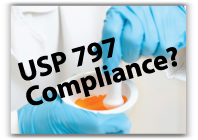 USP <797> requires compounding pharmacies to determine the risk level of the compounding done in their facilities and to perform the compounding in cleanrooms or other controlled environments as specified for the risk level.
USP <797> requires compounding pharmacies to determine the risk level of the compounding done in their facilities and to perform the compounding in cleanrooms or other controlled environments as specified for the risk level.
IEST is the leading global resource for cleanroom practices and contamination control.
IEST can help you:
- Determine, design, and maintain the proper controlled environment for your application.
- Develop standard procedures for cleaning the controlled environment.
- Implement environmental sampling to monitor air quality regularly for viable and nonviable particles.
- Develop standard procedures for personnel gowning and gloving.
Our goal is to make it easy for pharmaceutical laboratory personnel to access, understand, and apply critical cleanroom standards, to help ensure safer work environments and the highest quality of patient care. Because when it comes to cleanroom environments, there is simply no room for mistakes.
IEST can guide you through applying USP <797> guidelines for cleanroom and controlled environment applications.
- Increase your knowledge of cleanroom principles through continuing education courses:
- Participate in the Working Groups that write the standards and recommended practices for contamination control.
Learn how to comply with USP <797> today!
|
Noncompliant Pharmacies Must Submit Corrective Plans
State health officials shut down 11 compounding pharmacies in Massachusetts following surprise inspections at some 40 facilities, according to news reports February 5. Inspectors cited 21 additional facilities for minor deficiencies, and found only four compounding pharmacies to be in compliance.
Inspectors issued citations such as:
- non-compliant cleanroom controls
- non-sterile compounding practices
- inadequate environmental monitoring
- insufficient personnel training
- issues with storage of chemotherapy drugs
In order to resume business, pharmacies must submit plans outlining corrective actions, including renovations if necessary. and then pass re-inspections. Eight of the 11 closed pharmacies have submitted such plans.
The state Department of Public Health launched the inspections last fall following a deadly outbreak of fungal meningitis that killed 45 people and sickened more than 600 nationwide. The outbreak was linked to contaminated steroids supplied by New England Compounding Center (NECC), based in Framingham, Massachusetts. NECC was shut down after an inspection revealed violations such as mold and bacteria in cleanrooms, residues on processing equipment, and soiled mats near the compounding area.
Like NECC, many compounding pharmacies are large businesses that ship drugs to multiple states. In the case of non-compliant pharmacies with locations in other states, Massachusetts officials have notified the pharmacy boards in those states.
|